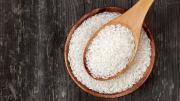Rising levels of atmospheric CO2 don’t just warm the planet, they lower the levels of beneficial vitamins and other nutrients in grains and edible plants. New research has shown that rice grown at carbon dioxide levels that could be reached as soon as 2050 are expected to suffer a one-sixth to nearly one-third loss of their B vitamin content. A study conducted at the Harvard T.H. Chan School of Public Health (HSPH) now quantifies the health impact of that change.
Globally, rice is humanity’s most important staple food, and for half a billion people, the crop provides more than 50 percent of their daily calories. That poses a serious potential problem: a prior study published by principal research scientist Samuel Myers and colleagues at HSPH found that when atmospheric CO2 reaches 550 parts per million (up from its current 410+ ppm), the reduced protein content of the rice will lead to protein deficiency in an additional 148 million people.That work also documented declines in the iron and zinc content of rice, wheat, barley, legumes, maize and potatoes—all of them important staple foods.
The latest study, published in GeoHealth, focuses on the impact of rising CO2 on the B vitamins folate, riboflavin, and thiamin. Maternal deficiencies in folate can lead to neural-tube defects in unborn children, as well as weakness and loss of appetite in adults; thiamin deficiency causes beriberi; and low levels of riboflavin can cause skin lesions and nervous disorders, including migraines. Using a framework that allows them to estimate the impact of these changes on the global burden of disease, the researchers estimate that an additional 132 million people would suffer folate deficiency based on their consumption of rice alone, 67 million additional people will become deficient in thiamin, and 40 million more people will become deficient in riboflavin.
Those numbers almost certainly understate the impact. As Myers and his coauthor, HSPH research associate Matthew R. Smith, write: “Because elevated CO2 concentrations are likely to reduce B vitamins in other crops beyond rice, our findings likely represent an underestimate of the impact of anthropogenic CO2 emissions on sufficiency of B vitamin intake.” And their new study does not attempt to quantify the global burden of disease that may be triggered by deficiencies in other nutrients that decline with rising CO2. As they put it, “CO2-induced nutritional declines could produce a major headwind on progress toward alleviating malnutrition, and deserves attention and concerted action.”









